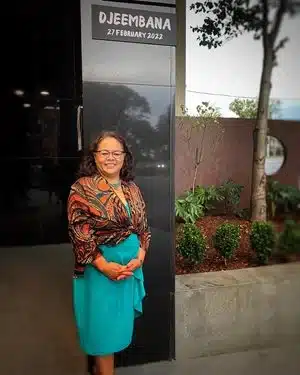Yarn up with Aunty Marilyn Clarke
Jony Berry, our Aboriginal and Torres Strait Islander Health Advisor, speaks to Dr Marilyn Clarke.
Yah Nunoye you Mob, my name is Jony Berry and I am so excited to announce this little segment.
What is a yarn up?
Yarn is a traditional word that Indigenous Australians use meaning to speak, talk and converse. The ‘up signifying that it will be a discussion.
I whole-heartedly love to yarn, especially to people making great change in our Nation, so it goes without saying that I am ecstatic for the opportunity to yarn up with someone who not only was the first Aboriginal obstetrician, but this incredible woman is also at the forefront of equality and inclusion within RANZCOG by chairing and leading in many committees. With great pride I would like to introduce you to Aunty Marilyn Clarke.

Jony: Firstly, thank you Aunty Marilyn for taking the time to answer these questions and for everything you are doing to not only be a role model but to also aid in breaking down the barriers and systematic obstacles that affect First Nations Australians in this field. Can you tell us a little about yourself? Who is your mob and where are you from?
I am a proud Worimi woman from Port Stephens area just north of Newcastle.”
Marilyn: I was brought up by my amazing mother, who was a trailblazer in her own right, being a single mum and pursuing a career in nursing then women’s health. I have a twin sister who is a GP, and my younger brother is Kelvin Kong, who is an ENT surgeon and a gifted leader. All three of us have a passionate drive instilled in us from our mum and extended family to give back to our community and we all contribute in our own way.
J: How did you find yourself in this field? What drove you to do what you do?
M: First and foremost my mum. She was one of the first independent women’s health practitioners in NSW and definitely planted a seed for women’s health in me. She always treated women wholistically and I would be so inspired by her work. Then in medical school, I was inspired by Sr Alison Bush, a legendary Aboriginal midwife at King George V hospital in Sydney. She taught me so much about obstetrics. Lastly, I spent a year working in PNG during my JMO years.
I saw first-hand how maternity care can make such a difference for women, literally life or death. I was hooked by then and knew that O&G was the career for me. ”
J: What barriers or obstacles did you find/ overcome in order to be where you are today?
M: There were many: racism, financial barriers, cultural load, to name but a few. But through it all I had the support of family and that made all the difference.
J: What is the best part of what you do?
M: I love working with women and empowering them to make the right decisions for their care. Their health is a journey for them to take, I am there to guide them with knowledge, and support them when they need it, through the good times, such as a beautiful vaginal birth with a healthy bub, as well as the bad, such as a stillbirth or a cancer diagnosis. It is such a privilege for me to be able to be there for them.
J: Do you have any advice for other First Nations Australians who are considering a career in obstetrics and gynaecology?
M: Reach out to others for support. It is now so competitive to get on the training program, and we often face additional barriers. We need to support each other as much as possible, and I hope to achieve that better through support structures with RANZCOG.
J: How can the medical field (colleges, hospitals, universities) better support Indigenous Australians wanting to undertake a career in medicine?
You can’t be what you can’t see, so its firstly giving school students the inspiration, the dream and the confidence that its possible.”
M: Schools need to be able to support kids as much as possible if they have the ability and the ambition. Some medical schools/universities are better than others in supporting and retaining Indigenous medical students- we need to emulate what works best. I think the JMO space and training pathways for Indigenous doctors has lots of room for improvement.
J: Thank you so much Aunty Marilyn for taking the time to answer these questions and for everything you do in this field and for First Nations Australians.